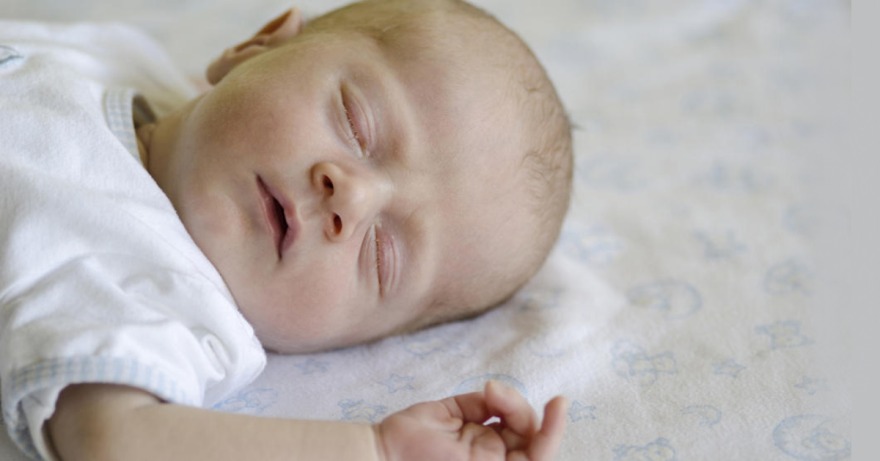Most of these factors relate to a baby’s physiology. Newborns have smaller lungs, and weaker muscles, and primarily breathe through their noses. As newborns, babies are still mastering breathing, as the umbilical cord provides oxygen directly to their bodies through their blood while in the womb. If you’re concerned about newborn breathing fast, understanding these physiological aspects can offer reassurance.
Newborns often exhibit a faster breathing rate due to their developing lungs and less robust muscles. Signs of potential breathing issues include rapid, heavy breathing, coughing, and wheezing sounds.
Newborn Breathing
Newborns breathe a lot faster than older babies, kids, and adults. They may initially breathe irregularly before developing a regular breathing pattern. Newborns younger than 6 months take about 40-60 breaths per minute. That looks pretty fast if you’re watching them.
Breathing may slow down to 30 breaths per minute while newborns sleep. In periodic breathing, a newborn’s breathing may stop for 5 to 10 seconds and then begin again more rapidly — around 40 to 60 breaths per minute — for 10 to 15 seconds. They shouldn’t pause more than 10 seconds between breaths, even when resting.
Causes and Concern for Baby’s Fast Breathing
Fast breathing on its own might not be alarming, but it’s crucial to note specific changes in your newborn’s breathing pattern. As you become more familiar with your baby’s typical breathing habits, observing any alterations is essential.
Identifying illness in a newborn can be challenging, as they might behave differently than usual. Understanding your baby’s norms will improve over time, enhancing your confidence in monitoring their health.
Seek medical assistance if you notice:
- Difficulty sleeping or feeding
- Severe fussiness
- A deep or barking cough
- Fever surpassing 100.4°F or 38°C (especially if your baby is under three months)
If your newborn displays any of these signs, seek immediate medical attention:
- Struggling to catch their breath
- Breathing at a rate exceeding 60 breaths per minute
- Grunting after each breath
- Flaring nostrils during breathing
- Visible difficulty in breathing, such as rib or neck muscles pulling in
- Bluish or greyish skin hue, particularly around the mouth, head, or central body
- Difficulty crying or dehydration due to lack of feeding
Conditions
Newborns might encounter breathing challenges caused by heart issues, infections, or other health conditions.
Breathing difficulties in newborns encompass:
- A profound cough, indicating possible lung mucus or infection.
- Whistling or snoring sounds that might necessitate clearing mucus from the nasal passages.
- Hoarse cries resembling barking, a possible indication of croup.
- Rapid, heavy breathing, possibly caused by airway fluid due to conditions like pneumonia or transient tachypnea.
- Wheezing is often linked to bronchiolitis.
- Persistent dry cough, suggesting potential allergies.
- Episodes where the newborn ceases breathing for at least 20 seconds, indicating possible apnea.
Tips for Parents
Coughing is a natural reflex that safeguards your baby’s airways from infections. If you’re concerned about your newborn’s breathing, observe them closely over a few hours to determine if it’s a minor cold or a more serious issue. When your newborn is unwell, it can be challenging to gauge the severity of their illness. Recording any concerning behaviour through a video can be helpful to share with a doctor, especially for online consultations or apps that enable quick communication.
For minor colds or if a doctor recommends home care, these suggestions might provide relief:
- Ensure your baby stays hydrated.
- Use saline drops to clear mucus.
- Create a steamy environment by running a warm bath or shower.
- Play soothing music to comfort your baby.
- Gently rock your baby in a preferred position.
- Ensure they get enough sleep.
What Do Breathing Noises May Mean?
Whistling noise
This might indicate a blockage in the nostrils that can be cleared through suctioning. Ask your paediatrician for guidance on gently and effectively removing mucus.
Hoarse cry and barking cough
This might indicate mucus or inflammation in the voice box, such as croup. It could be a sign of croup, in which case symptoms may worsen at night.
Deep cough
This is likely a blockage in the large bronchi, which are tubes that carry air between the windpipe and lungs. A doctor will need to listen with a stethoscope to confirm this diagnosis.
Wheezing
Wheezing can be a sign of blockage or narrowing of the lower airways. The blockage might be caused by asthma, pneumonia, or respiratory syncytial virus.
Fast breathing
This can mean there’s fluid in the airways from an infection, such as pneumonia. Fast breathing can also be caused by fever or other infections and should be evaluated right away.
Snoring
This is usually due to mucus in the nostrils. In rare cases, snoring can be a sign of a chronic condition, such as sleep apnea or enlarged tonsils.
Frequent sneezing
Sneezing is common in newborns and is not usually a cause for concern. This is because newborns have smaller nasal passages than adults and are still adjusting to breathing through their noses as they grow and develop.
If sneezing is accompanied by other symptoms like coughing, difficulty breathing, or a fever, you should talk to a doctor. It could be a sign of a respiratory infection.
Hiccups
Hiccups are common and can occur in babies, children, and adults. Eating too quickly and swallowing air while feeding are two possible causes of hiccups in newborns.
Source: healthline.com



Leave a Reply